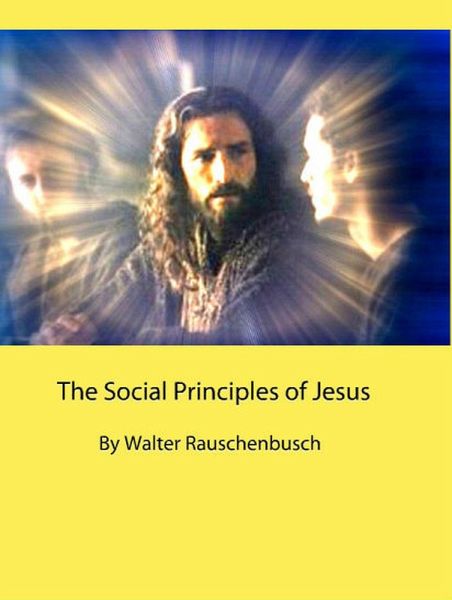
The Social Principles of Jesus (eBook, ePUB)

PAYBACK Punkte
0 °P sammeln!
The Value of LifeWhatever our present conceptions of Jesus Christ may be, we ought to approach our study of his teachings with a sense of reverence. With the slenderest human means at his disposal, within a brief span of time, he raised our understanding of God and of human life to new levels forever, and set forces in motion which revolutionized history.Of his teachings we have only fragments, but they have an inexhaustible vitality. In this course we are to examine these as our source material in order to discover, if possible, what fundamental ethical principles were in the mind of Jesus. T...
The Value of Life
Whatever our present conceptions of Jesus Christ may be, we ought to approach our study of his teachings with a sense of reverence. With the slenderest human means at his disposal, within a brief span of time, he raised our understanding of God and of human life to new levels forever, and set forces in motion which revolutionized history.
Of his teachings we have only fragments, but they have an inexhaustible vitality. In this course we are to examine these as our source material in order to discover, if possible, what fundamental ethical principles were in the mind of Jesus. This part of his thought has been less understood and appropriated than other parts, and it is more needed today than ever. Let us go at this study with the sense of handling something great, which may have guiding force for our own lives. Let us work out for ourselves the social meaning of the personality and thought of Jesus Christ, and be prepared to face his challenge to the present social and economic order of which we are part.
How did Jesus view the life and personality of the men about him? How did he see the social relation which binds people together? What was the reaction of his mind in face of the inequalities and sufferings of actual society? If we can get hold of the convictions which were axiomatic and immediate with him on these three questions, we shall have the key to his social principles. We shall take them up in the first three chapters.
DAILY READINGS
First Day: The Worth of a Child
And they were bringing unto him little children, that he should touch them: and the disciples rebuked them. But when Jesus saw it, he was moved with indignation, and said unto them, Suffer the little children to come unto me; forbid them not: for to such belongeth the kingdom of God. Verily I say unto you, Whosoever shall not receive the kingdom of God as a little child, he shall in no wise enter therein. And he took them in his arms, and blessed them, laying his hands upon them.--Mark 10:13-16.
The child is humanity reduced to its simplest terms. Affectionate joy in children is perhaps the purest expression of social feeling. Jesus was indignant when the disciples thought children were not of sufficient importance to occupy his attention. Compared with the selfish ambition of grown-ups he felt something heavenly in children, a breath of the Kingdom of God. They are nearer the Kingdom than those whom the world has smudged. To inflict any spiritual injury on one of these little ones seemed to him an inexpressible guilt. See Matthew 18:1-6.
Can the moral standing of a community be fairly judged by the statistics of child labor and infant mortality?
This book will look at the Gospels for guidance on how to live as social beings.
Whatever our present conceptions of Jesus Christ may be, we ought to approach our study of his teachings with a sense of reverence. With the slenderest human means at his disposal, within a brief span of time, he raised our understanding of God and of human life to new levels forever, and set forces in motion which revolutionized history.
Of his teachings we have only fragments, but they have an inexhaustible vitality. In this course we are to examine these as our source material in order to discover, if possible, what fundamental ethical principles were in the mind of Jesus. This part of his thought has been less understood and appropriated than other parts, and it is more needed today than ever. Let us go at this study with the sense of handling something great, which may have guiding force for our own lives. Let us work out for ourselves the social meaning of the personality and thought of Jesus Christ, and be prepared to face his challenge to the present social and economic order of which we are part.
How did Jesus view the life and personality of the men about him? How did he see the social relation which binds people together? What was the reaction of his mind in face of the inequalities and sufferings of actual society? If we can get hold of the convictions which were axiomatic and immediate with him on these three questions, we shall have the key to his social principles. We shall take them up in the first three chapters.
DAILY READINGS
First Day: The Worth of a Child
And they were bringing unto him little children, that he should touch them: and the disciples rebuked them. But when Jesus saw it, he was moved with indignation, and said unto them, Suffer the little children to come unto me; forbid them not: for to such belongeth the kingdom of God. Verily I say unto you, Whosoever shall not receive the kingdom of God as a little child, he shall in no wise enter therein. And he took them in his arms, and blessed them, laying his hands upon them.--Mark 10:13-16.
The child is humanity reduced to its simplest terms. Affectionate joy in children is perhaps the purest expression of social feeling. Jesus was indignant when the disciples thought children were not of sufficient importance to occupy his attention. Compared with the selfish ambition of grown-ups he felt something heavenly in children, a breath of the Kingdom of God. They are nearer the Kingdom than those whom the world has smudged. To inflict any spiritual injury on one of these little ones seemed to him an inexpressible guilt. See Matthew 18:1-6.
Can the moral standing of a community be fairly judged by the statistics of child labor and infant mortality?
This book will look at the Gospels for guidance on how to live as social beings.
Dieser Download kann aus rechtlichen Gründen nur mit Rechnungsadresse in A, B, CY, CZ, D, DK, EW, E, FIN, F, GR, H, IRL, I, LT, L, LR, M, NL, PL, P, R, S, SLO, SK ausgeliefert werden.













